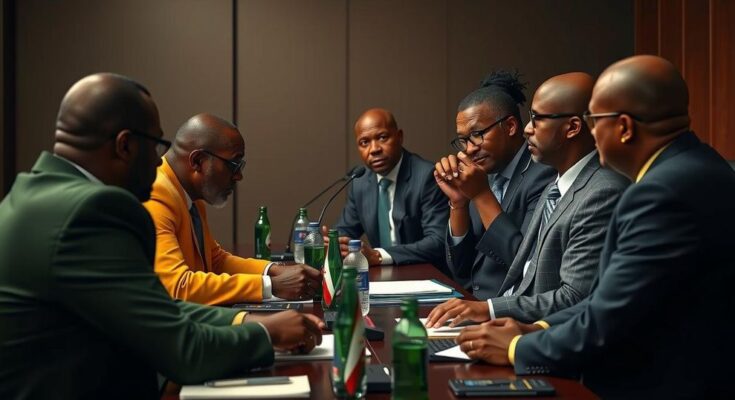South Sudan’s holdout groups have agreed to resume peace talks in Nairobi, facilitated by Kenyan President William Ruto, after expressing security concerns. The negotiations, part of the Tumaini Initiative, aim to include non-signatories of the 2018 peace agreement and address outstanding issues. The involvement of the Intergovernmental Authority on Development (Igad) is expected to bolster regional support for the process, which is critical for peace and economic recovery in South Sudan.
South Sudan’s holdout groups, which were not part of the 2018 peace agreement, have consented to recommence peace talks in Nairobi following months of security-related trepidations and dissatisfaction with the ongoing peace dialogue. This decision is a result of recent discussions held between Kenyan President William Ruto and South Sudanese leaders, including President Salva Kiir and First Vice President Riek Machar, during Ruto’s visit to Juba. President Ruto subsequently announced that the parties involved in the peace process have agreed to continue mediation efforts in Nairobi to resolve outstanding issues of concern. He expressed optimism that the widening divides between the government and opposition could be bridged, suggesting a potential shift towards sustainable peace and stability in the nation. Ruto emphasized that genuine and lasting peace in South Sudan could only be achieved through comprehensive dialogue. The Nairobi peace talks, part of the Tumaini Initiative, were initiated in May upon Kiir’s request for Ruto’s facilitation in the dialogue. The Intergovernmental Authority on Development (Igad), the original mediator for the 2018 peace deal, will now participate in this new mediation effort which aims to incorporate non-signatories to the peace agreement as an extension of the prior accord. Kenyan authorities assert that Igad’s engagement will strengthen regional backing for this renewed mediation process. Peace and stability in South Sudan are deemed crucial for the country’s economic recovery as well as the broader region’s stability. Following their discussions, the Kenyan leaders outlined various matters pertaining to establishing a firm foundation for lasting peace through the Tumaini Initiative. Statements from State House indicate that the initiative has advanced through significant dialogues with vital South Sudanese stakeholders, forming a basis for enduring peace in the region. Earlier this year, Ruto appointed mediators Lt-Gen (Rtd) Lazarus Sumbeiywo and Mohamed Guyo to facilitate negotiations between the Kiir-led Transitional Government of National Unity and the holdout factions. Despite earlier setbacks due to Juba’s withdrawing of its delegates, the groups have managed to reach agreements on six out of nine essential protocols concerning reconciliation, justice, power sharing, and long-term state reconstruction. While three other protocols were initialed, this step indicates the conclusion of discussions on these topics, though it does not signify a full consensus on their terms. President Ruto has previously rallied regional leaders to commit to pursuing peace, thereby consolidating efforts to quell violence. Sumbeiywo, renowned for his role in mediating the 2005 Sudan Comprehensive Peace Agreement which enabled South Sudan’s subsequent independence, had indicated that all parties are amenable to the implementation of a new constitution designed to avert future conflicts. Recently, the coalition government in Juba extended its mandate by two years, commencing in February, after failing to prepare for the presidential elections initially set for December. Kenya reports that a majority of the holdout groups, previously hesitant to engage, have now accepted the Kenyan-led mediation and deployed observers in support of the process. However, some of these groups are implicated in conducting attacks on transportation from neighboring Kenya and Uganda, thus presenting a regional security concern.
The peace process in South Sudan has been fraught with challenges since the inception of the 2018 peace agreement aimed at ending years of civil conflict. Numerous groups that did not sign the original agreement have expressed concerns regarding the security environment and the credibility of the peace process. President William Ruto’s engagement underscores Kenya’s commitment to facilitate dialogue, promote stability, and provide regional political support to address these holdouts and foster a more inclusive peace initiative. The Tumaini Initiative represents a concerted effort to integrate these stakeholders into a broader peace framework. The failure to conduct presidential elections and the recent extension of the coalition government’s mandate illustrate the complexities of governance and the urgent need for a sustainable reconciliation process.
In summary, the recent agreement by South Sudan’s holdout groups to resume peace talks in Nairobi marks a significant step towards addressing enduring issues within the peace process. With the involvement of President Ruto, who acts as a crucial mediator, alongside Igad’s participation, there is renewed hope for a more inclusive dialogue. The outcomes of these discussions will be pivotal in fostering stability and facilitating South Sudan’s economic recovery, as regional cooperation remains essential in resolving ongoing conflicts within the nation.
Original Source: www.theeastafrican.co.ke




